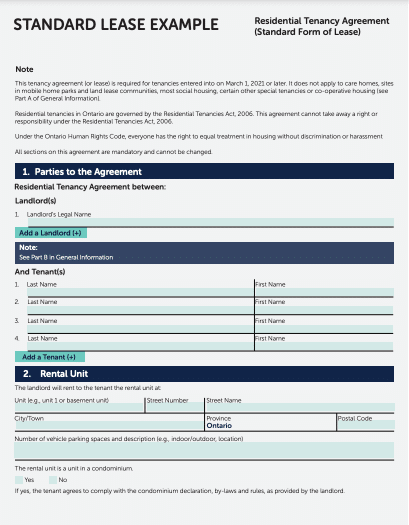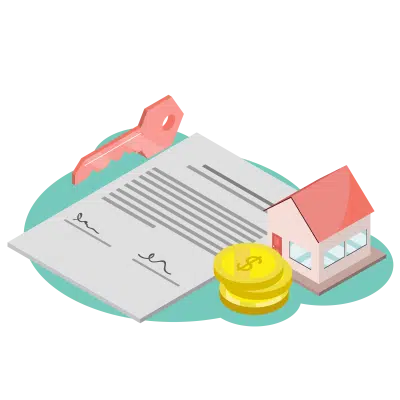Tenant Rights
There are laws in Ontario that protect both landlords and tenants. Rules surrounding evictions, leases, rent increases, and more can be found at the Government of Ontario website.
Rent, Deposits, and Other Charges
RENT
The total rent (“lawful rent”) includes: The base rent for the rental unit; and any separate charges for parking or other services and utilities, that the landlord provides to the tenant
DEPOSITS
There are times when you must pay for certain things, like deposits and charges for services. If you have paid for anything that you feel was incorrect, you should seek legal advice, as you may be able to apply to the Landlord Tenant Board (LTB) to get money back.
Invalid Clauses
Lease Agreements have clauses or rules that, once an agreement is signed, both landlords and tenants agree to abide by. Sometimes certain clauses may not be enforceable by law.
Pets
Under the RTA (Section 14), a landlord cannot include a clause in a lease agreement that prohibits animals in the rental unit or in or around the residential building.
However, there are some instances where a landlord can apply to the LTB to evict a tenant who has a pet, example, a pet causes damage to the rental property (RTA, Section 76)
Guests
Under the RTA, a landlord cannot:
- Charge extra fees or raise the rent due to guests in the rental unit.
- Stop tenants from having guests or roommates nor require prior notification or permission.
- But tenants handle the behaviour of their guests (noise, damage, other disturbances).
Note: “No Trespass” notices are not enforceable under the RTA

RIGHTS AND OBLIGATIONS
The tenant is entitled to reasonable enjoyment of the rental unit (e.g. quiet enjoyment, reasonable privacy, freedom from unreasonable disturbance and exclusive use of the rental unit).
If another tenant interferes with this right, the landlord must take reasonable steps to end the interference.
Except in cases of emergency or prior consent from the tenant, the landlord needs to provide a 24 hours’ written notice prior to entering the unit.
Notice must include:
- Reason for the entry
- Date and time (between 8 a.m. and 8 p.m.)
Additional Contacts
Rental Housing Enforcement Unit (RHEU)
For example, if your landlord:
- harasses you,
- evicts you illegally,
- comes into your place without permission, or
- threatens to do any of the above
Human Rights Tribunal of Ontario
- In cases of discrimination
- If the RTA does not apply, contract law still applies
City of Waterloo Municipal Enforcement
- If you suspect your rental unit is below minimum standards and the landlord is unwilling to fix the problem, you can request an inspection.
LEASING INFORMATION
Despite what landlords might tell their tenants, the end of an agreement does not mean the tenant has to move out or sign a renewal or new agreement to stay.
What to lookout for:
Legal Clauses
Illegal Clauses

Sample Lease Agreement
WUSA has developed a sample lease agreement for your reference with things to look out for before signing onto a lease.
Staying Safe from Rental Scams
Unfortunately, rental scams are a growing concern in student communities. Whether you’re renting a room or signing a lease for your first apartment, it’s important to be alert and know the signs of fraud.
Common Scam Tactics
How to Protect Yourself
What to Do if You Suspect a Scam
Use Trusted Resources: Places4Students.com
For a safer search experience, we recommend using www.Places4Students.com, the University of Waterloo’s official off-campus housing partner. All listings on the platform are vetted and approved by the University, offering a secure and reliable way to find housing.
Remember: asking for help early can prevent major headaches later. We’re here to help you navigate housing safely and with confidence.
Need Emergency Housing? There is help available.
If you’ve been displaced, or are in immediate need of housing, there are options available for you.
Contact WCRI and UWaterloo Residences to secure a space:
- WCRI: info@wcri.coop
- UWaterloo Residences: housing@uwaterloo.ca
Further information and resources can also be found on the Help at Waterloo section of the University of Waterloo Off Campus Housing page under Urgent housing.
Local and Provincial Resources
Places4Students
Places4Students is a service that assists students in finding off-campus housing, offering an organized platform for rental listings and roommate searches.
Places4Students verifies all University of Waterloo rental listings abide by The City of Waterloo’s Rental housing licensing bylaw.
Inclusive Housing Resources
There are supports available to help you find housing that feels safe and accessible.
Tip: Bookmark this section of the Housing Playbook so you can quickly find the resources most relevant to you.
WUSA has gathered resources that highlight your rights, available supports, and advocacy we’re doing to make housing more inclusive for you on-campus. We know that housing needs extend beyond the university, so we’ve also looked for resources in the wider community to support you off campus. This list brings together services and information designed to help you find safe, supportive, and accommodating spaces, whether you live in residence on-campus or off campus in the broader KW community.


